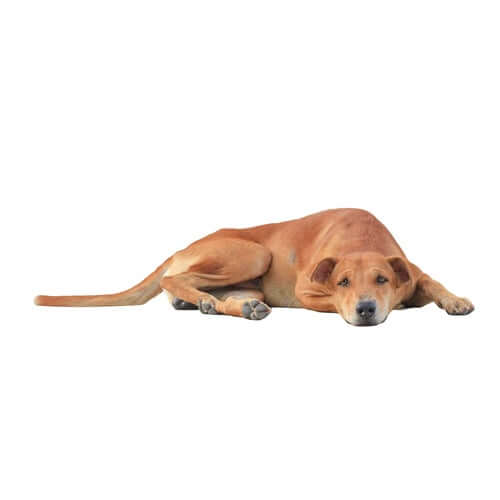Constipation in Dogs

Constipation is one of the main reasons why people take their dogs to the vets. It may be caused by different factors, and observing it is the best way to identify constipation in dogs.
Many owners pay little attention to their dog’s toilet activities. However, just like other conditions, early detection prevents further complications.
Why do dogs become constipated?
The causes of constipation in dogs are fairly common. The most common are:
- Improper diet. Dogs can ingest bones, objects, and even hair.
- Lack of water. Just like people, a lack of water is one of the main causes of constipation.
- Too much fiber. Some dog foods contain too much fiber. Depending on their digestive system, this can cause constipation.
- If the dog is sedentary, it may have trouble excreting. The intestines need movement to work.

There are other more complex reasons related to diseases or biological conditions. Take intestinal obstruction as an example. This may be caused by a digestive process or the ingestion of a foreign object. It’s not uncommon for dogs to pick up all kinds of objects and eat them.
Another similar disease is intestinal paralysis. Traumatic experiences or routine changes are also causes of constipation. Even some hormonal values such as calcium deficiency are associated with constipation in dogs.
In adult dogs, constipation may be normal, but also as a result of old age. It’s been observed that, as dogs age, their digestive processes change. They struggle to digest certain foods they used to eat without a problem. Natural nutrition is always the most appropriate.
It’s always important to evaluate your pet’s appetite. If they’re showing disinterest in certain foods or discomfort after eating, then you should take them to a specialist.

Symptoms of constipation in dogs
In most dogs, similar symptoms may be seen before constipation:
- Little or no excretion. The main symptom is that the animal can’t do a bowel movement. Or, when they’re able to, the stools are round and very hard.
- A lot of effort to excrete. They may complain or cry when making the effort to excrete.
- Hard stomach. Having a hard stomach can show constipation problems or inflammation of the colon.
- Reluctance to go and loss of appetite. When dogs suffer from acute constipation they become depressed.
- Some dogs vomit occasionally. This is because their bodies are trying to get rid of something in the only way they can.
How to avoid constipation in dogs
- Having a balanced diet. Today, natural dog food is widely known for its benefits. One of them is that it improves the animal’s digestive system and prevents constipation.
- Control water consumption. Owners constantly need to measure water consumption. Drinking water should also be a habit in animals.
- According to their breed, condition, and possibilities, dogs need exercise. Daily walks are important so that the intestines can be stimulated.
- Visit the vets for any irregularities. You don’t need to rush to the vets if your dog has been constipated for one or two days. But, if you notice your dog is in pain, has a fever, or is inactive, then don’t hesitate to consult them. These symptoms may indicate further complications that may need treatment.
Some recommendations
- To find out if the animal is constipated, it’s important to observe the amount and condition of their stools. Including color, texture, and odor.
- When animals are constipated, they have very dark feces. They are small, hard, and separate. If you have other pets, you’ll notice that when your dog is constipated, its stools look like a rabbit’s.
- Also, be aware of mucus, undigested food, or blood in the stool. The latter is common when your dog needs to make more effort to go.
- Constipated dogs not only have swollen stomachs, but also swollen eyes and limbs.
- They may be irritable for no apparent reason. Some dogs may also lose weight due to a lack of appetite and other gastrointestinal problems.
This text is provided for informational purposes only and does not replace consultation with a professional. If in doubt, consult your specialist.